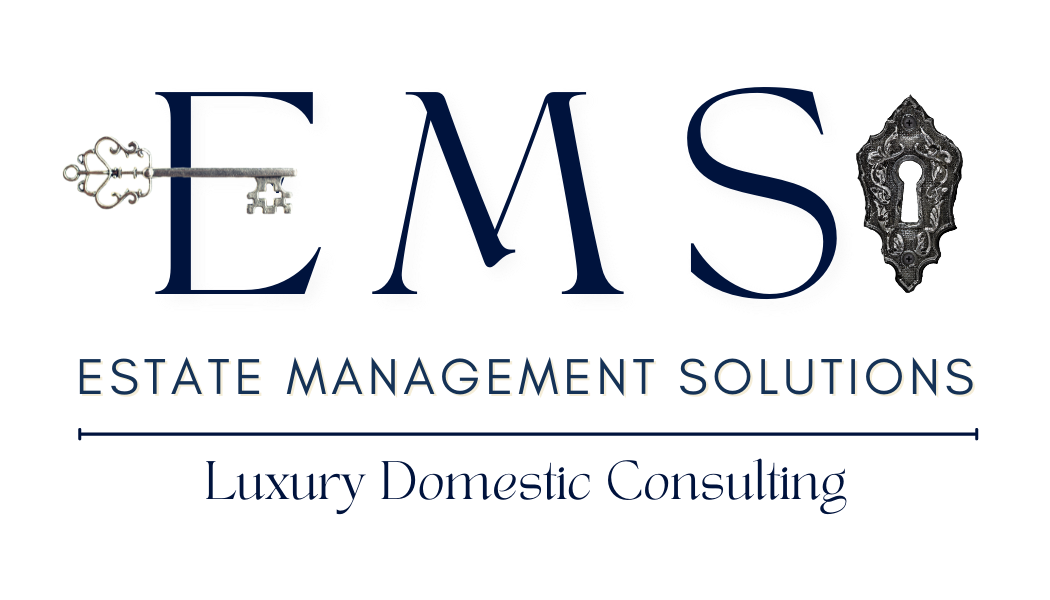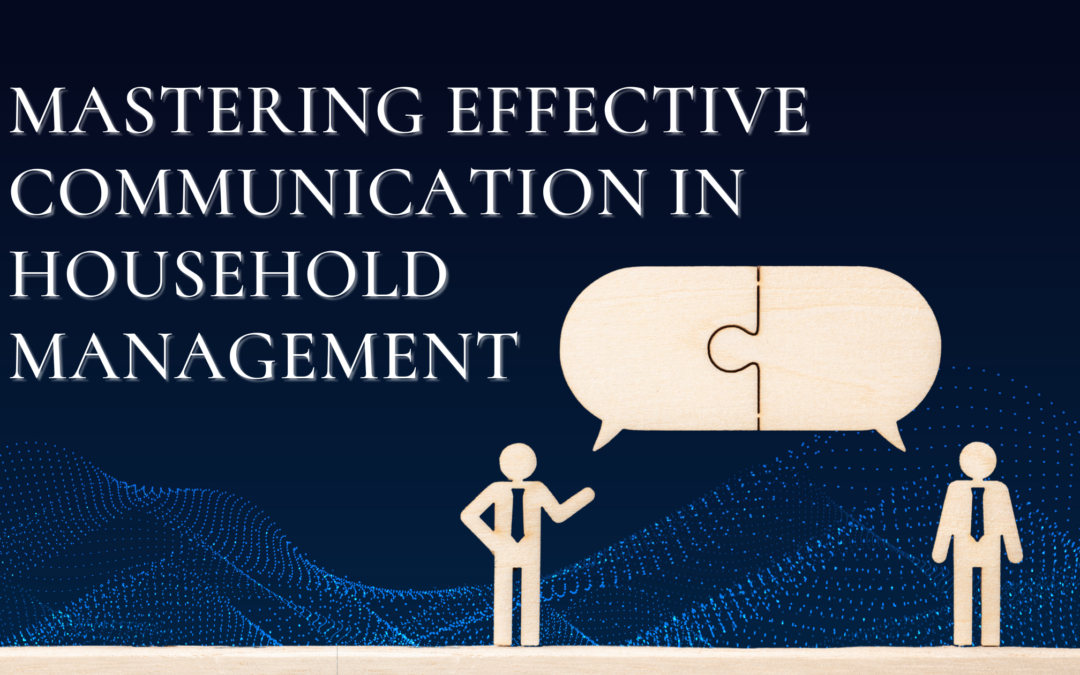As a Household Manager, you have a lot on your plate, from dealing with clients to collaborating with coworkers and supervisors. Effective communication goes beyond just talking – it’s the key to ensuring everyone is on the same page. Without it, there’s a risk of misunderstandings or missing important details. Improving your communication skills will help you meet client expectations, enhance teamwork, and ensure you excel in every aspect of your job. This guide will walk you through practical strategies to make your communication smoother and your work more rewarding.
Understanding the Basics of Communication
Communication in household management, especially for Household Managers, is about more than just talking. It involves:
- Words: This refers to the actual things you say and how you say them. It’s not just about the information you convey but also the tone, politeness, and clarity of your speech. For example, if you ask someone to clean a room, how you ask and the words you use matter. Being polite and clear helps ensure everyone understands and cooperates.
- Actions: This involves non-verbal cues like gestures and facial expressions. Even without saying anything, your body language and facial expressions can convey much information. For instance, a smile can show appreciation, while a frown might indicate dissatisfaction. These actions can affect how people perceive your messages and intentions.
- Listening: This is about truly paying attention to what others are saying. It’s not just hearing the words, but understanding the message and showing that you care about their thoughts and feelings. Good listening helps build trust and can lead to better cooperation within a household.
In your day-to-day work, clear communication is key. For instance, when a client tells you how they want their space cleaned, paying attention to both their words and non-verbal cues can help you understand their exact preferences. Also, being clear and concise in your responses ensures that there are no misunderstandings.
However, communication blocks can happen. Maybe a client’s instructions are vague, or a coworker misunderstood a schedule change. Such mix-ups can lead to incomplete tasks or dissatisfaction. That’s why it’s crucial to be proactive in seeking clarity and confirming your understanding.
The Role of Active Listening in Household Management
Active listening is a crucial skill for Household Managers. It’s all about fully concentrating on what is being said, rather than just passively ‘hearing’ the message of the speaker. Here’s how you can practice active listening:
- Focus entirely on the speaker: When someone is talking to you, it’s not just about hearing their words; you should also pay attention to their body language (how they move and look) and their tone of voice (how they sound). It’s like trying to understand their feelings and thoughts through their whole way of speaking, not just their words.
- Show that you’re engaged: To let the speaker know that you’re interested in what they’re saying, you can do things like nod your head or say things like “I see” or “Understood.” This shows that you’re actively participating in the conversation and not just zoning out.
- Ask clarifying questions: If something the speaker says isn’t clear to you, it’s okay to ask questions to make sure you understand. This shows that you want to get things right and that you’re involved in the conversation.
- Repeat what you heard: After the speaker has talked, you can repeat what you understood to confirm that you got it right. For example, if they said they want the living room cleaned first and then the kitchen, you can say something like, “So, you’d like me to clean the living room first and then move on to the kitchen, is that correct?” This helps make sure everyone is on the same page.
Applying these active listening techniques can significantly reduce misunderstandings and mistakes in your work. It also builds trust and respect with your clients and team members.
Expressing Needs and Concerns Effectively
Effective communication is not just about understanding others; it’s also about being understood. As a Household Manager, you may need to express your own needs or concerns, like needing certain cleaning supplies or more time to complete a task. Here’s how to communicate effectively:
- Be clear and respectful: When you talk to someone, be straightforward and polite. For example, if you need more cleaning supplies, you can say, “I’ve noticed that we’re almost out of floor cleaners. Can we order some more?” This means you’re being clear about what you need without being rude or demanding.
- Pick the right moment: Timing matters. Don’t bring up something important when the person is busy or distracted. Wait until you have their full attention. It’s like waiting for a good time to have a chat, just like you’d wait for your friend to finish their video game before talking to them.
- Use ‘I’ statements: Instead of blaming others or making them defensive, talk about your feelings or perspective. For example, instead of saying, “You didn’t give me enough time to finish,” you can say, “I find it hard to complete the task in the time you gave me.” This way, you’re expressing how you feel without pointing fingers or causing conflict.
Such communication ensures that your needs and concerns are heard and addressed, leading to a more efficient and harmonious working environment.
Managing Conflicts through Communication
Conflicts are sometimes part of working in household management. How you handle these situations is a big part of mastering effective communication in household management. Here are some steps to manage disagreements:
- Stay Calm: This means that when things get a bit tricky or frustrating, try your best to stay relaxed and not get upset. When you’re calm, it’s easier to figure out and fix problems.
- Listen to All Sides: It’s like being a good detective. When there’s a disagreement or issue, try to understand why the other person thinks the way they do. This can help you find a solution that’s fair for everyone.
- Speak Honestly, but Respectfully: When you talk about what’s bothering you, be truthful, but don’t be mean or hurtful. Use kind and polite words to express your concerns. This makes it easier for others to listen and understand.
- Work on Solutions Together: Instead of deciding everything on your own, try to find answers that everyone can agree on. It’s like teamwork, where everyone contributes ideas to solve the problem and reach a solution that makes everyone happy.
So, in simple terms, these tips are about staying calm, listening to what others have to say, being honest but polite when you talk, and working together to find solutions that everyone can agree on. It’s all about making communication smoother and problem-solving easier.
Effective Communication in Task Management
Good communication is crucial for managing household tasks effectively, especially in the role of a Household Manager. Here’s how to communicate efficiently to ensure tasks are on track:
- Clear Expectations: It’s essential that everyone clearly understands their responsibilities and deadlines. This is about making sure each team member knows what is expected of them and by whom. Clear communication of roles and timelines helps prevent confusion and ensures smooth operation.
- Regular Updates: Regular brief meetings or discussions should be held to keep everyone informed about the progress of tasks. These check-ins serve as opportunities to provide updates on what has been completed and what remains to be done. It helps in maintaining transparency and alignment among team members.
- Simple Tools for Better Understanding: Utilize straightforward organizational tools such as to-do lists or schedules. These tools are vital in visualizing tasks and deadlines, making it easier for everyone to keep track of their responsibilities. A well-organized checklist or schedule can be a powerful tool in ensuring nothing is overlooked.
Implementing these strategies is about ensuring that everyone is aligned and organized. Clear expectations, regular updates, and the use of simple, effective tools are key to facilitating teamwork and enhancing the efficiency of household management.
Building Relationships through Communication
Effective communication also helps in building strong relationships in the workplace. Here are some ways to use communication to create better work relationships:
- Be Friendly and Open: This means being nice and approachable to the people you work with. When you’re friendly, others feel comfortable talking to you.
- Show Appreciation: Just saying “thank you” to your colleagues or clients when they help you or do something good can make them feel happy and important. It’s like giving them a little pat on the back for their efforts.
- Welcome Feedback: Being open to feedback means being okay with people telling you what you did well and what you can do better. It’s like listening to advice so you can get better at your job.
By following these guidelines, you can create a more productive and harmonious environment where everyone can work together effectively.
Resolve Conflicts with Confidence
Mastering effective communication in household management is key to success in this field. It’s not just about doing tasks; it’s about understanding and being understood, resolving conflicts, and building strong work relationships. With these tips, we hope you’ll find your work more streamlined and enjoyable. Remember, good communication is the foundation of great service in household management.
 Critical Advice
Critical Advice 
As a household manager, mastering communication is your superpower. Listen actively to grasp the details of every task and the nuances of each request. When you talk, be clear and direct to avoid misunderstandings. If conflicts arise, stay cool and aim for solutions that work for everyone. Good communication breeds trust, ensures tasks are completed efficiently, and helps maintain a positive atmosphere at home. It’s simple: clear communication equals a happy, well-run household.
Additional Resources
- The Keys Course: This is a 1-hour self-driven online course that covers the fundamentals of navigating a successful relationship while working in someone’s home. We’ve gathered insights from conversations with fellow recruiters and hiring managers to include the most common topics relevant to our field. This course provides the best opportunity to build a solid foundation for a successful professional relationship in an industry as dynamic as the personalities we support.
- Blogs: Explore our collection of informative blogs in Estate Management Solutions. These blogs offer valuable insights, tips, and advice on various aspects of household management, communication, and building strong relationships in this industry. They are a great resource for expanding your knowledge.
Step up your Household Management game with our expert guide to mastering effective communication. Learn the art of conveying your message clearly, from the words you choose to your body language and active listening skills. Discover the importance of expressing needs and managing conflicts with grace, and how these skills can lead to a harmonious and efficient work environment. Visit us at HNWSolutions.com and transform your management approach through the power of effective communication.


